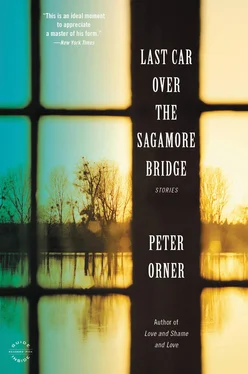Ha.
Are you finished with this speech, Arthur?
One night, about a month or so later, it was Walt who after dinner took the book off the shelf in the living room where Sarah had safely stored it for posterity. He carried it upstairs to his study in the flat of his hand like a waiter carrying a tray. Then he locked the door and went to Rome. Night was thinning into morning by the time Cataline uttered the last of his famous last words: But if fortune frowns on your bravery, take care not to die unavenged. Do not be captured and slaughtered like cattle, but, fighting like heroes, leave the enemy a bloody and tearful victory.
Walt hears trumpets. If fortune frowns! Viva Cataline! Viva the traitor!
Furthermore, as my brother so cogently argues, no self-respecting republic should be without a little healthy rebellion. It keeps everybody honest, and with a blowhard like Cicero around, somebody had to draw a line across the Forum with his sword. Walt slides off his chair and onto the carpet. He stares at the ceiling. His study has always been a box that envelops him, protects him. There are days he mourns this room, wonders how it will go on without him when he’s gone. Right now, the distance between himself on the floor and the ceiling is intolerable.
I’m lying in a grave on my own carpet. To think there are people who believe that, when it’s all over, the angels sing and we float up higher and higher. They don’t doubt. They believe. Before I put on my other sock, I’ve doubted the entire day. And my brother writes: “The great revolutionist was found far in advance of his slain foemen, still breathing lightly, and showing on Cataline’s face the indomitable spirit that had animated him when alive.”
The Roman Army carried his severed head back to the Eternal City in a basket.
Once, outside this very room, a jay rammed into the window. Then he backed up and flew into it again. Again. Again. Again, until he finally dropped into the dirt. They say only man is valiant enough to die for lost causes.
In the blue-gray light, Walt Kaplan thinks, My people sleep. My own brother, a man who has faith enough — believes enough — to devote his life to raising an ancient debaucher from the dead, sleeps in leafy Brooklyn beside his squirrelly wife. My Sarah and my daughter sleep across the hall. In sleep, they breathe their finite breaths. The dawn sun claws upward. I sink into carpet. I dream of home when I’m home, of love when I love. How can I shout farewell from the mountaintop if I never leave the house? How can I rise to protect my people if I don’t even own a sword?
Thanks to Ellen Levine for steadfast faith and invaluable support.
Thanks also: to Dean Paul Sherwin and Maxine Chernoff at San Francisco State, to Betsy Uhrig for her generous and infinite patience, to Lynn Warshow for her careful eye over the course of four books, to Carolyn O’Keefe for her tireless advocacy, as well as to Eric Orner, Ronald Orner, David Krause, Nick Regiacorte, Audrey Petty (who dreams about Harold Washington also), Alex Gordon, Rob Preskill, Melissa Kirsch, Tom Barbash, Jason Roberts, Junse Kim, and Ed Schwartzchild.
And finally and foremost: to Katie and Phoebe.
I also wish to express my gratitude to the editors of the following publications, where stories in this collection first appeared: “Foley’s Pond” and “The Vac-Haul” in the Paris Review; “At the Kitchen Table” and “Dyke Bridge” in Granta; “Eisendrath” (as “No Light”), “Paddy Bauler in a Quiet Moment,” “The Mayor’s Dream,” and “Harold Washington Walks at Midnight” in A Public Space; “Geraldo, 1986” and “Shhhhhh, Arthur’s Studying” in Conjunctions; “Last Car Over the Sagamore Bridge” in the Harvard Review; “Pampkin’s Lament” in McSweeney’s; “Occidental Hotel” and “The Divorce” in Narrative; “Herb and Rosalie Swanson at the Cocoanut Grove” and “Spokane” in Bomb; “February 26, 1995” in Guernica; “Grand Pacific Hotel, Chicago, 1875” in Ploughshares; “Reverend Hrncirik Receives an Airmail Package” in the Southern Review; “Horace and Josephine” in Ninth Letter; “Denny Coughlin: in Memory” in Grantland; “The Moors of Chicago” in Once; “Waldheim” in New American Writing; “Renters” in World Literature Today; “Plaza Revolución, Mexico City, 6 a.m.” in Witness; and “Longfellow” and “1979” in Zyzz yva .
Thanks as well to the editors of The Black Warrior Review, 14 Hills, Cadillac Cicatrix , the Cincinnati Review , the Cellar Door, Cutbank, Lost , the Mississippi Review, Northeastern Magazine, Northeastern Law Magazine , and Third Coast .
“Nathan Leopold Writes…” first appeared in Chicago Noir (Akashic Books, New York); “Belief, 1999” appeared in The Return of Král Majáles (Litteraria Pragensia Books / Charles University, Czech Republic).
“On the 14” appeared as “On the 88” in the San Francisco Chronicle .
“Pampkin’s Lament” was reprinted in Pushcart Prize XXXII .
The line at the end of “The Poet” is from William Meredith’s “The Wreck of the Thresher (Lost at Sea, April 10, 1963)” from Effort at Speech: New and Selected Poems (Triquarterly Books / Northwestern University Press).












